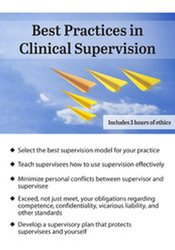

Are you considering joining the ranks of those who are approved to provide this invaluable oversight of fellow professionals? Are you already a clinical supervisor and need to formalize and enhance your knowledge and skills? This recording presents a blueprint, based on established best practices, for providing effective and ethical clinical supervision.
Explore clinical supervision through the lens of critical legal, ethical, and risk management issues. Gain clarity on how to define the goals of supervision, as well as the responsibilities of both supervisor and supervisee. Analyze the “How Do I?” of clinical supervision, with details on individual vs. group supervision, case consultation, interactive live supervision, audio and video sessions, and other methods and techniques. Determine how to meet, and then exceed, your obligations regarding competence, confidentiality, vicarious liability, and other standards.
This online program is worth 5.75 hours CPD.
| File type | File name | Number of pages | |
|---|---|---|---|
| Manual - Best Practices in Clinical Supervision (1.48 MB) | 76 Pages | Available after Purchase | |
| Manual - Best Practices in Clinical Supervision - French (1.48 MB) | 76 Pages | Available after Purchase | |
| Manual - Best Practices in Clinical Supervision - Italian (1.48 MB) | 76 Pages | Available after Purchase |

George B. Haarman, PsyD, LMFT, is a licensed clinical psychologist and a licensed marriage and family therapist with over 40 years of experience working in a variety of settings, including private practice, youth detention centers, juvenile group homes, child protective services, and juvenile probation. Dr. Haarman completed basic and advanced supervisor training required by the Kentucky Board of Psychology Examiners and maintains approval by the board to act as a supervisor. In his private practice, Dr. Haarman has provided clinical supervision to clinical and counseling practicum students as well as consultation about clinical supervision to psychologists for over 25 years. He is a national speaker on clinical supervision, depression, school refusal, ADHD, emotional disorders in children and adults and the DSM-5®. He is the author of three books: Clinical Supervision: Legal, Ethical, and Risk Management Issues, School Refusal: Children Who Can’t or Won’t Go to School, and Mastering DSM-5®. Dr. Haarman received his doctorate in clinical psychology from Spalding University in 1989. He has been an instructor at Jefferson Community College, Bellarmine University, and Spalding University.
Speaker Disclosures:
Financial: Dr. George Haarman maintains a private practice and is an adjunct professor Spalding University, Jefferson Community College, and Bellarmine University. He receives a speaking honorarium and recording royalties from PESI, Inc. He has no relevant financial relationships with ineligible organizations.
Non-financial: Dr. George Haarman is a member of the American Psychological Association and the Kentucky Psychological Association.
ESTABLISH ROLES AND RESPONSIBILITIES
CHOOSE THE MOST EFFECTIVE SUPERVISION MODEL FOR YOUR SETTING
MASTER EFFECTIVE METHODS AND TECHNIQUES OF SUPERVISION
AVOID AND RESOLVE PROBLEMS THAT ARISE DURING SUPERVISION
PROPERLY EVALUATE SUPERVISEES AND SUPERVISION
CASE STUDIES
| 5 |
|
| 4 |
|
| 3 |
|
| 2 |
|
| 1 |
|
Satisfaction Guarantee
Your satisfaction is our goal and our guarantee. Concerns should be addressed to info@pesi.co.uk or call 01235847393.
Please wait ...